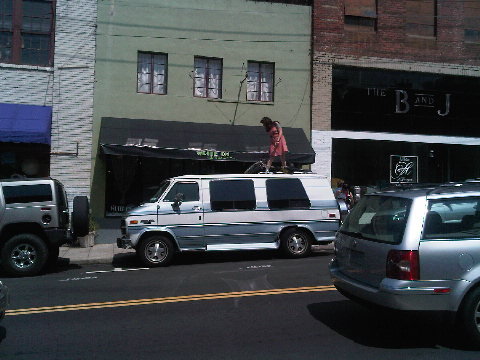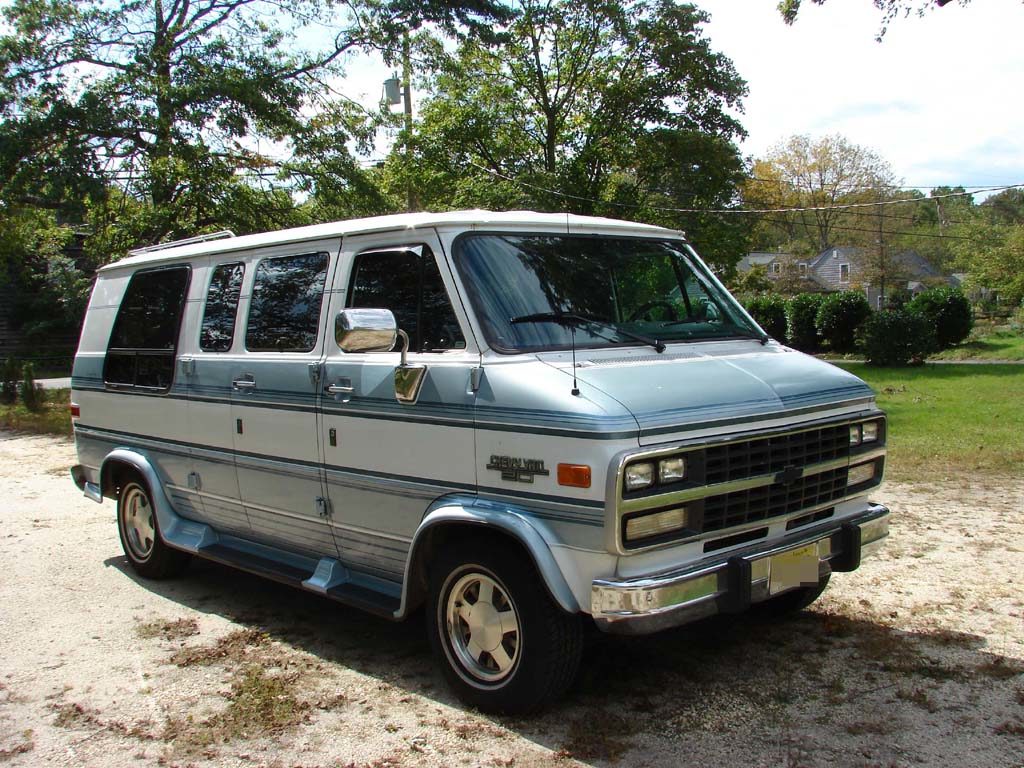Vandwelling as a lifestyle
Sure, I’m a little ahead of the curve (hey! Women should know how to handle our finances!), but I didn’t realize that when I got a conversion van in 2009, that too would also be visionary. I guess thinking outside the structures of capitalism is catching, huh?
Since 2010 or so, there’s been a marked increase in the number of people who are sharing online stories about living in their vans, beautiful video blogs on permanent travels in RVs, and hardcore hobbyists who love sharing about vintage trailers, van conversions for living on the road, and how to make an on the road lifestyle work.
When I travelled the US & Canada in my Chevy G20 conversion van, living in it part-time from 2009-2010, and then more recreationally from 2011-2014, it was one of my main focuses in life. Storing, caring for, and showing off a dope van is a job. For those of us who love vans, it never feels like work! But of course, work happened so money could flow into the van…and then mostly out of the the exhaust.
Here’s a breakdown for you who want to think about making a life lived on the road make dollars and sense.
The economics of my van: money spent
After a heartfelt search over the Winter and Spring of 2009, I purchased a 1995 Chevy G20 and named her The Dream, because Aerosmith’s Dream On was playing on the radio when I first hopped inside.
- She cost $1500, but I knew it needed $1300 in work + registration = $3,000 cash in hand to drive off. I had this money because I had a Real Job for 3/4 of the previous year and thus got a Real Tax Return.
- Insurance: $75/mo when it lived officially in Philly, and $120/mo when it lived officially in NYC.
- Maintenance: about $750k/yr (oil changes of course, but also ball bearings, windshield wiper motor, the catalytic converter once, brakes twice, windows once)
- Gas: It had a 27-gallon tank that would go 350 miles, and gas has been between $2.50-$4/gallon.
Annually I spent on average $750 (maintenance) + $850 (insurance) + $500 (gas not including big trips others helped with) = $2,000.
So, over the five years I had her, that’s $10k. Add in buying her and there’s $11.5k.
?!?!?!
When I had that van, I did not think of myself as a person with an extra $11 and a half thousand dollars lying around (hint: I kinda wasn’t), but yet the money came to me, making me a person who actually DID have extra thousands of dollars to spare on a ridiculous, fun, delightful luxury after all.
I’m a bit jaw drop just writing that out but them’s the numbers. Where the hell did that money come from?

The cash flow of a van: money in
Where the money came from:
- Side hustle money paid for the maintenance; since I throw most of my side hustle money into savings / put it aside for big things I want, this worked out in my budget. When I travelled that looked like random cash gigs, and when I was home with a regular job, that looked like…more random cash gigs.
- Insurance was paid for by my monthly envelope-method savings from my regular income from the various part-time digital economy jobs I had since it was a known and regular expense.
- Oil changes and a decent chunk (¼ to a ⅓) of the gas was paid for by fellow travellers who I’d share rides and company with.
- Once a year my art tour paid for a month of insurance and $100 towards maintenance.
Here’s the interesting part: I really wanted that van running and in my life, and so I went and got the money.
If I needed $400 for brakes, I’d go earn that.
When my insurance went from $70/mo to $125, I found the extra $55 a month without loan drama or touching my grocery funds.
Knowing what I know now about money, I’m not surprised looking back to observe that if I needed a certain level of money, I went and found exactly that level.
Having a beloved object can make spending money on that object a bit of an achilles heel (pet owners holler), but of course part of the whole POINT of having money is accessing things we’d like to have. When that’s a cool ride, it’s a positive reinforcement. When that’s having less or no debt, it’s harder because the reinforcement isn’t there in the same way. But what I’d like you to know is that it’s the same thinking, saving, and going out to get more money that can find an extra $11.5k for fun or to dig the hell out of debt.
A twist of fate
Five and a ½ years into our time together, my van was stolen. Straight up grand theft auto style, except WAY slower because she did not accelerate quickly. Fortunately nothing crucial was in there, but sadly my niceish camping gear, lots of RV equipment, and tragically my beloved teenage punk rocker tape collection was lost as well.
Foremost: a hex on van thieves.
However friends, there are two things that I want you to know about that helped ease the pain. (Spoiler: they are both INSURANCE.)
One was full liability insurance on the van – at a cost of an additional $8/mo. The other was my renters insurance, at a cost of about $27/mo. So, for $35/mo I had the coverage needed to pay me back for a good amount of the shit lost as well as for the van itself. What the liability insurance didn’t cover (it maxed out at $500 for contents), the renters insurance did (except for the tapes. My darling collection didn’t count, sadly.) In the end I got about $4500 from insurance – technically enough to buy a new van, though that is not what I did. I invested the money.
It was time to think about something new, and frankly having your vehicle stolen from in front of your house will yuck the yum of having a van in a big city.

Why travel and live in a van? Money isn’t the point.
Even though about 40% of what I spent on having a van came back to me in cash and the rest went “out the exhaust,”, that time in my life also did something else: I lived my life as if money was not the point (pro tip: MONEY IS NOT THE POINT OF LIFE), and I made it work because I still managed to live below the means of the money I did have: when I needed more money I made myself go get more money because I gave a huge shit about the thing I was spending it on.
If you can do something that’s completely not about money–most likely available to you because you have done something to manage and handle your money–that’s one kind of freedom. I was a vandweller while I was still paying down student loans, had only a few grand in the bank as savings.
I worked intermittently when I was travelling and regularly when I was not. I had a plan in place to keep increasing my savings as opposed to draining them, and that was enough to keep me stable and chugging along. It wasn’t getting me anything fancy. It got me people, experiences — and the knowledge that I could do it again. If I made it my focus, I now know I could scrape together multiple thousands of dollars while working part time and making art full time.
It cost me $11.5k, and $7 of that is gone forever. I think it was money well spent. Having savings is important, and having an apartment and stuff in it is nice. But it’s not the point of life. The point of life is living it and I did the hell out of that in my van.
*****
If you liked this, check out this post:
Funding the Dream, thinking of a vintage trailer.
